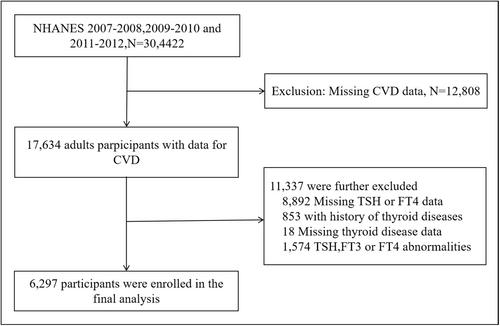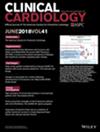Relationship between Thyroid Feedback Quantile-based Index and cardiovascular diseases in a population with normal thyroid function: Evidence from the National Health and Nutrition Examination Survey 2007–2012
Abstract
Background
Previous study has demonstrated a link between TFQI, indicating the central sensitivity of thyroid hormones, and conditions like obesity, diabetes, and metabolic syndrome.
Hypothesis
Nevertheless, the potential relationship between TFQI and cardiovascular disease (CVD) in individuals with normal thyroid function has yet to be established.
Methods
The present research is a retrospective cohort investigation that included a total of 6297 individuals who had normal function of the thyroid and no history of thyroid disorders. These participants were selected from National Health and Nutrition Examination Survey data set, covering the years 2007–2012. The calculation of TFQI was performed depending on FT4 and TSH. Given the complex survey design and sample weights, we used multivariate linear regression models and stratified analysis to evaluate TFQI's correlation with CVD.
Results
Subjects with CVD had greater levels of TFQI than those with no CVD. After adjusting for other covariates, TFQI exhibited a positive association with CVD risk, and the OR was 1.706 (p = .005). In subgroup analyses that were stratified by sex and BMI, it was shown that female individuals who had CVD had greater levels of TFQI in comparison to female participants without CVD (p = .002). Furthermore, elevated levels of TFQI were consistently connected to a raised incidence of CVD in the BMI (>28 kg/m2) group after regulating for different covariates. Furthermore, correlation analysis showed an association between TFQI and metabolic biomarkers.
Conclusions
The levels of TFQI are strongly connected to the prevalence of CVD, indicating that energy metabolism may be related to the occurrence of CVD.


 求助内容:
求助内容: 应助结果提醒方式:
应助结果提醒方式:


